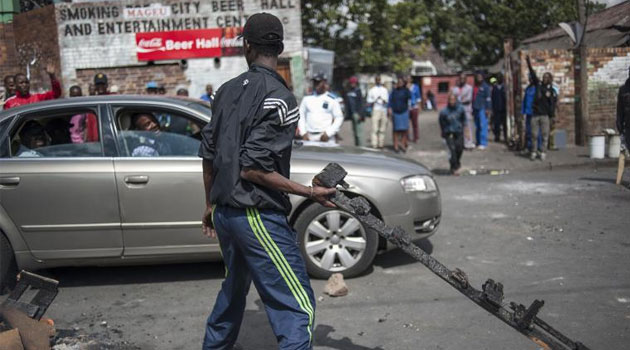
Prominent comedian Kagiso Lediga said although Africans are culturally still “very conservative”, they are now learning to laugh at their strife, their suffering and oppressive governments.
JOHANNESBURG, Dec 27 – Race relations are still a touchy subject in South Africa, but edgy jokes in comedy clubs release bottled-up social tension and trigger gales of laughter from multiracial audiences.
“Apartheid wasn’t funny,” says Mahlatse Botopela, 24, a black member of the audience at a recent show at a hotel in Krugersdorp near Johannesburg.
But when it is joked about, it helps with the “healing process… it’s something you can relate to,” she says.
Her white friend, Elizma Hatlen, agrees: laughing about race “helps us to adapt to one another”.
A trailblazer in provocative racial jokes was South Africa’s most high profile comedian, Trevor Noah, who recently scaled international heights by replacing US star Jon Stewart as host of Comedy Central’s “The Daily Show”.
Noah has a black South African mother and a white Swiss father, so perhaps he has special dispensation to laugh at both sides.
But that hasn’t stopped a gaggle of stand-up comedians of all races lining up to help push the boundaries to where no subject is taboo and no person or group is untouchable.
– Race not a taboo –
Accompanied by his acoustic guitar, comedian Daniel Friedman, who goes by the stage name Deep Fried Man, sings: “Forget the rhino — save the whites. The second (that) Mandela died — it’s the white genocide.”
Friedman, who is white, pokes fun at white fears that after the death of liberation icon Nelson Mandela, blacks would take revenge for centuries of racist rule and drive them into the sea.
Sifiso Nene, 34, tells the audience: “It’s hard being a black person in South Africa because it takes the entire village to raise one child, whereas for white people it only takes Mavis (the black maid), that’s all it takes!”
“I am one of those kids who was raised by the village while my mother raised white kids,” he later told AFP.
“There are some things, much as they are funny, they really are the truth — the gag is reality.”
Friedman told AFP after the Johannesburg show: “Race is bit taboo elsewhere but it’s our most popular topic here.”
Prominent comedian Kagiso Lediga said although Africans are culturally still “very conservative”, they are now learning to laugh at their strife, their suffering and oppressive governments.
“We don’t have to be depressed after all,” he said.
Comedians in other parts of Africa are often wary of mocking politicians, but they are prime targets in South Africa.
– Burgeoning sub-culture –
President Jacob Zuma is the butt of many jokes, including satirical comments about a scandal over taxpayers’ money being spent on multi-million dollar upgrades to his private home.
David Kibuuka, a comedian originally from Uganda, suggests that Zuma, who often stumbles repeatedly while reading out numbers, should be pardoned for the excessive spending because he obviously did not understand the figures involved.
Under South Africa’s progressive constitution, comics enjoy almost unfettered freedom of expression — but that doesn’t mean their targets don’t get upset.
Zuma once tried to sue popular cartoonist Zapiro over a cartoon showing him about to rape a blindfolded “Lady Justice”, representing the justice system.
The president, who was previously acquitted on a rape charge, later dropped the case.
Now, comedy has become a burgeoning sub-culture in South Africa and the numbers of clubs and performers are growing each year as the topics get edgier — from religion to race, war, and even terrorism.
Comedy is a pain reliever, said local promoter Takunda Bimha. “Comedy comes from pain and because of that people need an outlet.”














































